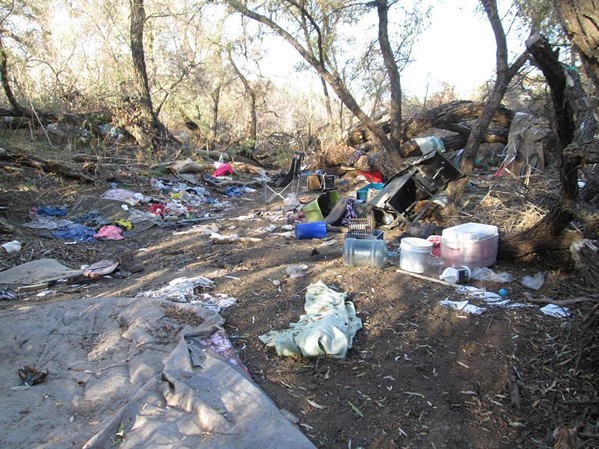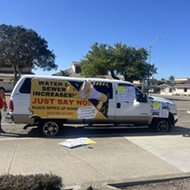[
{
"name": "Promo Temp Targeted",
"id": "PromoTempTargeted",
"class": "inlineCenter",
"insertPoint": "4",
"component": "15511697",
"requiredCountToDisplay": "0"
},
{
"name": "Ad - Medium Rectangle CC01 - 300x250 - Inline Content",
"class": "inlineCenter",
"insertPoint": "8",
"component": "15582119",
"requiredCountToDisplay": "12"
},{
"name": "Ad - Medium Rectangle LC01 - 300x250 - Inline Content",
"class": "inlineCenter",
"insertPoint": "18",
"component": "15582122",
"requiredCountToDisplay": "22"
},{
"name": "Ad - Medium Rectangle 9 - 300x250 - Inline Content",
"class": "inlineCenter",
"insertPoint": "28",
"component": "15582121",
"requiredCountToDisplay": "32"
}]
Typical discussions about homelessness tend to focus on its most obvious problem, a lack of shelter. What often gets left out, though, are the tangential issues that arise from the crisis.
On Oct. 3, the Central Coast Regional Water Quality Control Board set out to examine one such issue: the ways in which homelessness and water quality intersect.
"This is a high priority for us as an agency," said John Robertson, executive director of the Central Coast Regional Water Quality Control Board. "California has far and away the largest population of homelessness. ... The complexity of the problems [is] becoming greater."
In a daylong workshop—Challenges and Solutions: The Intersection of Water Quality and People Experiencing Homelessness on the Central Coast (available to video stream at slo-span.org)—designed to suss out those concerns and talk about potential solutions, more than a dozen leaders in the field from across the state convened in San Luis Obispo to participate in a series of panel discussions. Panelists included political figures like San Diego Mayor Kevin Faulconer and scientists with environmental nonprofits like the Pacific Institute and the Coastal Watershed Council.
"We are shifting our perspective," Robertson explained about the purpose of the workshop, "from this traditional regulatory relationship with municipalities, to try to facilitate a much broader dialogue and an exchange of ideas."
Water regulators, environmental protection groups, and homeless advocates say they're increasingly concerned about how California's homelessness epidemic is impacting both environmental and public health. Officials worry about how the growing presence of homeless camps along riverbeds has polluted waterways and habitats.
Robertson said his agency has found human sources of fecal bacteria in five major Central Coast watersheds—the Morro Bay watershed, Watsonville Slough, Arroyo Burro, Rincon Creek, and San Lorenzo River. More broadly, about 40 percent of all California's surface water is impaired by fecal bacteria, according to data presented at the workshop.
But pinning down the sources of fecal contamination is difficult. In-depth testing is required to determine if the bacteria originated from humans or another animal. If human-caused, it's sometimes impossible to conclude with certainty whether it's open defecation at a homeless camp, a septic failure, or something else.
"Teasing out the exact source of that human bacteria is really, really difficult," said Whitney Reynier, a river scientist for the Coastal Watershed Council, a nonprofit that's working to clean up and revitalize the San Lorenzo River in Santa Cruz.
According to statistics provided by Laura Feinstein, a senior researcher with Pacific Institute, transient camps are the seventh leading cause of fecal contamination in water bodies. The top cause is "unknown," followed by urban stormwater and then agriculture and livestock.
"This is a fairly unsettled question," Feinstein said. "We don't know what portion we can really say is caused by [homelessness]."
Officials also discussed the trash, habitat disturbances, and brush fires that are common in the natural areas where unsheltered homeless live. Robertson noted the dozens of fires that started inside the Salinas Riverbed near Paso Robles this past year.
"Wildfires are a human health threat, and there's little we can do to a watershed that's more destructive to water quality than wildfires," Robertson said. "Deforestation is occurring in these areas. The canopy is being destroyed. Bank erosion and excavation is occurring, causing sedimentation and further loss of habitat. ... These are significant threats."
Panelists touched on how a lack of access to clean water, sanitation, and, ultimately, housing for individuals in homelessness compounds the issues. Though state law enshrines clean water and sanitation as fundamental human rights, reality doesn't necessarily deliver.
According to Feinstein, in 2015 more than 200,000 Americans lacked adequate access to toilets and/or hot and cold water. More than half of those people were homeless.
"Accessible water and accessible sanitation—that's where people experiencing homelessness often face barriers," Feinstein said. "The science is very clear and well-established that not having running water, safe drinking water, [and] a toilet affects people's health."
The public restrooms and hygienic facilities that exist, Feinstein said, are often out of reach to the homeless, and they close at night.
"The problem is they're often very far from where people actually live. ... They're often dangerous to visit. They're often poorly maintained and cleaned," Feinstein said.
State and regional water board officials at the workshop acknowledged that the availability of these amenities has to improve.
"In 2017, this water board adopted a 'human right to water' resolution. We take this very seriously," Robertson said.
When discussing big-picture solutions to the challenges of homelessness and water, panelists frequently pointed to the simple need for more housing and more funding to serve the nearly 130,000 people in California who face homelessness, according to 2018 counts.
"Most people do not want to continue living by the river, but we are challenged in providing a range of services and housing," said Lahela Mattox, of the California Homeless Coordinating and Financing Council. "At the end of the day, we're talking about human beings. We're talking about your neighbors, your children. ... We are responsible." Δ
Assistant Editor Peter Johnson can be reached at [email protected].
Latest in News
Comments (5)
Showing 1-5 of 5
Readers also liked…
-

SLO police identify alleged driver who hit and killed couple
Dec 22, 2022 -

When the levee breaks: Oceano residents, county officials walk a tightrope of regulations to manage Arroyo Grande Creek, which some say led to the levee's failure in January
May 18, 2023 -

Cal Poly report highlights offshore wind's potential to spur green energy transition
Jun 8, 2023









